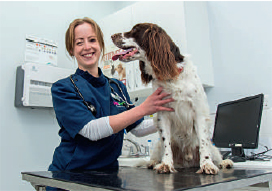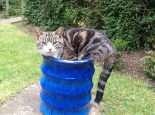Pet answers: keep them healthy

Don’t settle for pet theories, get pet answers! Veterinary surgeon Holly Norman answers your summer animal health questions
Q: I’ve heard a lot about dogs getting grass seeds stuck in their paws. Is this something I need to worry about?
We are hopefully reaching the end of the ‘grass seed’ season now but it’s worth keeping an eye out for them as they can cause a lot of trouble. Grass seeds or ‘foxtails’ are particularly spiky and typically get trapped in the fur between your dog’s toes. They can also get stuck down ears or enter the mouth. Once stuck, they will often work their way into the skin and you’ll see a painful red raised lump between the toes. Dogs will often limp and lick at the affected area. Once the grass seed has worked its way into the skin, unfortunately the only way to remove it is under sedation at the veterinary practice. If left untreated, the grass seed will continue to work its way deeper and deeper into the body and can cause serious problems. To prevent issues, it’s best to check your dog’s paws after every walk, making sure you separate each toe and look underneath the paw as well as in all the nooks and crannies around the pads. If your dog has particularly hairy feet, it may be worth getting these trimmed.
Q: I’ve seen lots of advertisements for pet first aid courses. Are these any good?
Ah, that’s a tricky one. The answer is, it depends on the course! There are many out there and the quality can vary hugely depending on who organises them, whether this be a member of the public or a veterinary surgeon or veterinary nurse. I love the idea of pet owners being up to speed on dealing with common emergencies and knowing how to initiate first aid. Most courses will cover things like wounds, drowning, electrocution, CPR and coping with catastrophes. I would suggest checking in with your local practice to see if they are running a first aid evening or can recommend a provider.
Q: I have just brought home a new bunny! I can’t wait for him to meet my other rabbit but I’m worried about how they’ll get on. Any tips?
Congratulations! How exciting! A lot depends on the age and gender of the bunnies. Neutered rabbits will often get on better (with no risk of having babies!) and younger ones will adapt to strangers more quickly. Bunny bonding is usually a slow process and it can take a while for bunnies to make friends. Start with having them being able to see and lay next to each other, for example with a wire mesh between them. This allows them to bond but means they can both get away and be alone if they would prefer. Once they are happily laying next to each other, start introducing supervised play time in a neutral area, such as the bathroom. Make it a pleasant experience with lots of toys and treats and gradually build up the time they are happy to spend together. Just like people, some of us easily make friends whereas others sometimes need a bit longer!
Do you have a pet or animal health question? Send it to us at: Holly will endeavour to answer all questions, whether published or not!
Dr Holly Norman BSc(Hons) BVetMed MRCVS
Veterinary surgeon and Practice Partner at:
Peterborough Vets4Pets
231-233 St Paul’s Road
Peterborough
PE1 3RL
Tel: 01733 890777
Bretton Vets4Pets
Inside Pets at Home
Unit 2 The Bretton Centre
Peterborough, PE3 8DN
Tel: 01733 261094
Image: www.freepik.com/free-photos-vectors/card
card vector created by freepik















